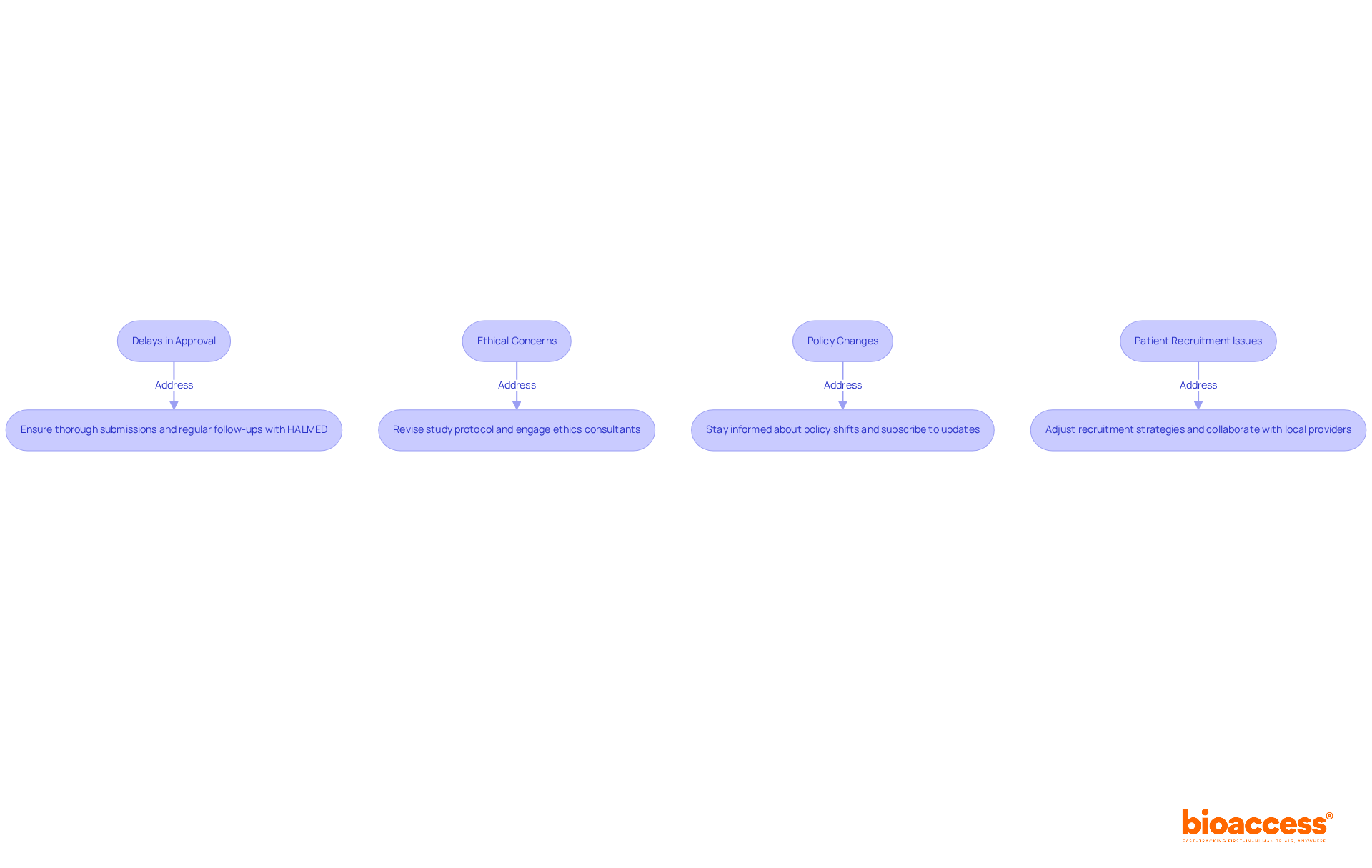


Navigating the complex landscape of oncology drug trials in Croatia demands a thorough understanding of the regulatory framework set forth by the Croatian Agency for Medicinal Products and Medical Devices (HALMED) and the Central Ethics Committee (CEC). With the full implementation of the Clinical Trials Regulation (EU) No 536/2014 on the horizon, researchers face unprecedented stakes in ensuring patient safety while accelerating trial approvals.
The journey to compliance, however, is not without its challenges. From securing ethical approvals to managing potential delays in documentation, the path can be daunting.
So, how can researchers effectively navigate these regulatory hurdles to optimize their oncology studies and achieve timely results?
To effectively conduct oncology studies in Croatia, understanding the regulatory framework established by the Croatian Agency for Medicinal Products and Medical Devices (HALMED) and the Central Ethics Committee (CEC) is crucial. This framework is influenced by EU regulations, particularly the Clinical Trials Regulation (EU) No 536/2014, which will be fully applicable starting January 2025. This regulation aims to streamline the approval process while enhancing patient safety.
Ethical Approval is a key component; all clinical trials must secure a favorable opinion from the CEC, which assesses the ethical aspects of the study. Typically, this review process takes between 30 to 90 days, depending on the complexity of the trial. Additionally, the Croatian regulatory steps for oncology drug trials are essential, as trials must conform to both national and EU directives, ensuring that all investigational medicinal products (IMPs) are produced and managed according to Good Manufacturing Practices (GMP).
Moreover, Patient Recruitment in Croatia benefits from a diverse population, which can significantly accelerate the recruitment process for oncology studies. A comprehensive understanding of local demographics and health statistics is vital for crafting effective recruitment strategies.
In this context, bioaccess® provides a wide range of services, including:
Their expertise ensures that oncology studies in Croatia not only meet legal requirements but also benefit from faster site initiation and patient enrollment. Staying updated on the Clinical Trials Regulation EU No 536/2014 is essential for maintaining compliance and effectively leveraging the legal framework.

To successfully navigate the Croatian regulatory steps for oncology drug trials, it is essential to compile a comprehensive set of documents. This process not only ensures compliance with the Croatian regulatory steps for oncology drug trials but also significantly enhances the chances of prompt approval.
Clinical Trial Application (CTA) is a fundamental requirement. This includes the application form, study protocol, and investigator's brochure (IB), which outline the trial's objectives and methodology. Without a well-prepared CTA, the submission may face delays.
Informed Consent Forms (ICFs) must be clear and adhere to ethical standards. These documents ensure that participants fully understand the study's purpose, procedures, and potential risks, fostering trust and transparency.
Insurance Documentation is mandatory. Proof of insurance coverage for study participants safeguards their welfare during the research, reflecting the trial's commitment to participant safety.
Ethics Committee Approval is crucial. A copy of the favorable opinion from the Central Ethics Committee (CEC) must be included, demonstrating that the trial has met ethical standards.
If applicable, Import Licenses for Investigational Medicinal Products (IMPs) must be secured prior to submission. This step is vital to ensure compliance with regulatory requirements.
It is imperative to submit all documents in both paper and electronic formats, as specified by the relevant authority. A well-structured submission not only aids in compliance but can also significantly speed up the review process, increasing the likelihood of prompt approval.

Once your documentation is ready, the next step is to submit your application to the regulatory authority and the Clinical Ethics Committee (CEC). This process is crucial for ensuring compliance and facilitating a smooth approval journey.
Efficient communication is essential for successfully navigating the compliance environment, particularly in oncology studies. By employing these strategies, you can cultivate a productive relationship with Croatian governing authorities, which is essential for navigating the Croatian regulatory steps for oncology drug trials and ensuring a more efficient approval process.

Carrying out oncology trials in Croatia presents a range of compliance challenges that require careful navigation through Croatian regulatory steps for oncology drug trials. Understanding these issues is crucial for successful clinical research. Here are key challenges and effective strategies to address them:
Delays in Approval: Trials often face delays due to incomplete documentation or regulatory compliance issues. To mitigate this, ensure that all submissions are thorough and adhere to current regulations. Regular follow-ups with HALMED can help pinpoint the reasons for any holdups, as even a single month of delay can cascade into years of postponed approvals. Bioaccess provides extensive assistance in study setup and approval procedures, ensuring that all required documentation complies with the Croatian regulatory steps for oncology drug trials, including import permits.
Ethical Concerns: If the Clinical Ethics Committee (CEC) raises ethical issues, be prepared to revise your study protocol or informed consent forms. Engaging with ethics consultants can provide valuable insights and facilitate smoother resolutions. Bioaccess can assist in reviewing study documents to ensure compliance with ethical standards.
Policy Changes: Staying informed about policy shifts is essential, particularly with the recent implementation of the Clinical Trials Regulation. Subscribing to updates from HALMED and relevant professional organizations can keep you informed about the Croatian regulatory steps for oncology drug trials that may affect your study. Bioaccess keeps clients updated on the Croatian regulatory steps for oncology drug trials and provides guidance on navigating these complexities.
Patient Recruitment Issues: Slow recruitment can significantly hinder study timelines. To enhance recruitment efforts, consider adjusting your strategies or collaborating with local healthcare providers to broaden outreach. Employing decentralized study designs and patient-focused methods can also enhance recruitment rates. Bioaccess connects innovative Medtech, Biopharma, and Radiopharma startups with top-ranked clinical research sites, facilitating effective patient recruitment.
By anticipating these challenges and preparing solutions in advance, you can streamline the trial process and enhance the likelihood of successful outcomes. Leveraging Bioaccess's expertise in comprehensive clinical trial management is a strategic move that can lead to more efficient and effective research.

Navigating the regulatory landscape for oncology drug trials in Croatia is not just a task; it’s a critical endeavor that demands a thorough understanding of the country’s legal framework. By mastering the complexities of the Croatian Agency for Medicinal Products and Medical Devices (HALMED) and the Central Ethics Committee (CEC), stakeholders can ensure compliance and significantly improve the chances of successful trial outcomes.
Key components of this process include:
The significance of a well-prepared Clinical Trial Application (CTA), informed consent forms, and strict adherence to Good Manufacturing Practices cannot be overstated. Moreover, addressing common challenges such as approval delays and ethical concerns is essential for a seamless trial experience.
Ultimately, leveraging the expertise of specialized services like bioaccess® can greatly streamline the oncology trial process in Croatia. By staying updated on regulatory changes and employing strategic recruitment methods, researchers can enhance the efficiency and effectiveness of their clinical studies. Embracing these best practices not only fosters compliance but also propels the advancement of oncology research, ultimately benefiting patient care and driving medical innovation.
What is the regulatory framework for conducting oncology trials in Croatia?
The regulatory framework for oncology trials in Croatia is established by the Croatian Agency for Medicinal Products and Medical Devices (HALMED) and the Central Ethics Committee (CEC), influenced by EU regulations, particularly the Clinical Trials Regulation (EU) No 536/2014.
When will the Clinical Trials Regulation (EU) No 536/2014 be fully applicable?
The Clinical Trials Regulation (EU) No 536/2014 will be fully applicable starting January 2025.
What is the purpose of the Clinical Trials Regulation (EU) No 536/2014?
The regulation aims to streamline the approval process for clinical trials while enhancing patient safety.
What is required for ethical approval of clinical trials in Croatia?
All clinical trials must secure a favorable opinion from the Central Ethics Committee (CEC), which assesses the ethical aspects of the study.
How long does the ethical review process typically take in Croatia?
The ethical review process typically takes between 30 to 90 days, depending on the complexity of the trial.
What must oncology drug trials in Croatia conform to?
Oncology drug trials in Croatia must conform to both national and EU directives, ensuring that all investigational medicinal products (IMPs) are produced and managed according to Good Manufacturing Practices (GMP).
How does patient recruitment in Croatia benefit oncology studies?
Patient recruitment in Croatia benefits from a diverse population, which can significantly accelerate the recruitment process for oncology studies.
What services does bioaccess® provide for oncology studies in Croatia?
Bioaccess® provides a wide range of services including feasibility studies, site selection, compliance reviews, setup, import permits, project management, and reporting.
Why is it important to stay updated on the Clinical Trials Regulation EU No 536/2014?
Staying updated on the Clinical Trials Regulation EU No 536/2014 is essential for maintaining compliance and effectively leveraging the legal framework for conducting oncology studies.